Deals, deals, deals.
Global merger and acquisition activity may be in the doldrums, but don’t tell that to the folks in the private equity arena, or at Carlyle Group (CG) in particular. Dealmakers at Carlyle have been on a buying binge in recent weeks, snapping up an array of iconic companies. This week, they agreed to a buyout of Getty Images in a partnership with company management, paying $3.3 billion to acquire the stock-photo agency from another LBO shop, Hellman & Friedman. Also this week: news that Carlyle will be a key player in a $3.5 billion proposed buyout of Chinese advertising firm Focus Media (FMCN), now in the process of trying to delist from Nasdaq.

Indeed, Carlyle has emerged as the single most active private equity firm in the leveraged buyout universe over the last 12 months, moving up from fourth place a year ago in the league tables compiled by Thomson Reuters. In that period, it has agreed to or completed some 19 leveraged buyouts with a cost to the acquirer of $14.08 billion. (That figure includes the net debt on the balance sheets of the companies being acquired, but not the debt used to finance the transactions.) The runners up – BC Partners, Apollo and KKR – have completed less than half as many deals and have invested only $9.2 billion to $10.03 billion in those LBOs in the last 12 months.
Carlyle does seem to be on a bit of a tear, and its acquisitions have been eclectic, to put it mildly. A stock-photo agency, a controlling stake in an asset management company (TCW, formerly a division of French bank Société Générale), an industrial pumps business from United Technologies (UTX), a stake in a railway company, an auto-paint business – these are just some of the most recent additions to the roster of its portfolio companies. (Intriguingly, the Carlyle dealmaker behind the purchase of TCW from the French bank is Olivier Sarkozy, half brother of the former French president, Nicolas Sarkozy.)
The presidential campaign has attracted a lot of attention to the private equity arena – little of it favorable – thanks to Mitt Romney’s role at Bain Capital, another big buyout firm. But Carlyle, no stranger to controversy, seems to feels that this isn’t the time to adopt a low profile. On the contrary: As the company’s co-CEO, William Conway, pointed out after the newly public Carlyle reported its second-quarter earnings last week, some of its best investments have been made during similarly uncertain and volatile environments.
RELATED: Private Equity Fights Image
“Our recent investments reflect the choice opportunities we see today as well as our long-term investment horizon,” he said. And investors in Carlyle’s buyout funds appear happy to provide the dry powder the firm needs to complete these deals: The second quarter was the strongest the LBO firm has witnessed in terms of fundraising since the 2008 financial crisis; it pulled in nearly $4 billion of fresh capital in that period alone.
Investors in Carlyle’s newly issued shares probably aren’t unhappy, either, despite the fact that the company reported a net loss for its first quarter as a public firm thanks in part to writedowns on the value of some of its portfolio companies. Carlyle’s IPO ended up being conservatively priced back in May, at $22 a unit, below the original range of $23 to $25. Today, those units change hands on Nasdaq at $25 a share, having gained ground even as the broader market has wobbled in recent months.
Does Carlyle’s commitment to doing deals, combined with its recent stock price gains, make it a buy? Not if you already had qualms about investing in a private equity company; it’s simply not the same thing as getting the inside track on the deals its bankers believe are the most appealing. Moreover, not all of its funds are doing well – its latest distressed debt vehicle has struggled to attract assets, for instance. Investors need to see that assets are moving to Carlyle and sticking there, since the management fees that Carlyle collects contribute to its financial wellbeing.
Investors taking a bullish stance on Carlyle today need to be convinced that Conway’s upbeat view of the dealmaking prospects is accurate and that the $19 billion of LBO bets it has placed in the last 12 months will pay off. Certainly, the company’s willingness to seize opportunities is intriguing, and it is known for its negotiating prowess. Still, assets under management did dip slightly in the second quarter, from $159.2 billion in the first quarter to $156.2 billion. In the grand scheme of things, that’s a drop in the ocean, but investors are right to be wary.
Still, the wave of dealmaking may mean that if the global economy shows signs of stabilizing and if you’re interested in investing in the shares of an alternative investment manager, Carlyle may be the one to look to. Picking up assets cheaply at the bottom of a valuation cycle is a sign of a savvy manager, and the sheer diversity of the transactions shows that Carlyle is alert to the obvious risks or putting too many of its eggs into a single basket. Looking for some leverage of your own, in this case, to an economic recovery? You could venture further, and fare worse.






